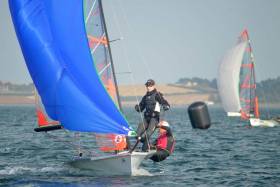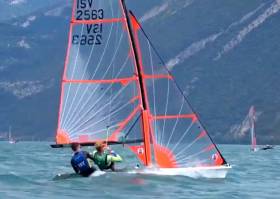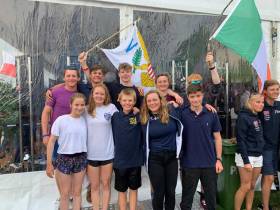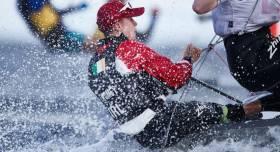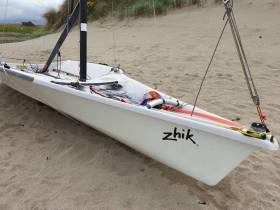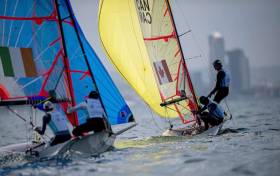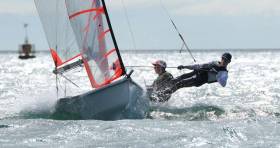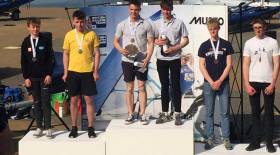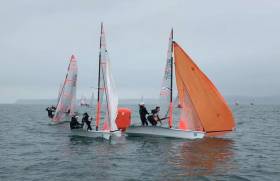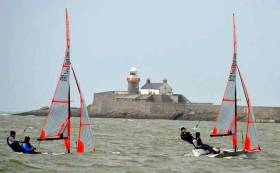Displaying items by tag: 29er
Kohls Win 29er Triple Crown in Much Improved Irish Fleet
The 29er Northerns was raced in Strangford Lough Yacht Club last weekend as part of the 30th RYA NI Youth Sailing Championships as Afloat reported earlier. It was the final event of the '29er triple crowns'. Nine teams competed: 3 all boys, 5 mixed and an all girls crew. The standard of the fleet has progressed at a stellar pace allowing a competitive regatta with many changes of leads.
Saturday started with a lot of wind which rapidly decreased to deliver 3 races in medium conditions. The high number of laps on offer allowed many close battles at marks and the sailors had to be solid on their boat handling to maintain or gain positions.
Elysia O'Leary and Chris Bateman showed skills and speed taking the first race win ahead of Triple crowns leaders Lola and Atlee Kohl. The second race saw the return of ISAFs YW Rian McDonnell-Geraghty and Nathan Van Steenberge to winning affairs with O'Leary-Bateman hot on their heels. The final race of the day saw an increase in wind strength and provided some drama.
"The standard of the fleet has progressed at a stellar pace allowing a competitive regatta with many changes of leads"
The leaders of the fleet did not see a lap had been added on the Race committee boat. The Kohl's siblings, on the other hand, had no hesitation and went on for the extra lap with McDonnell-Van Steenberge right on their transom... Realising their error, 4 boats restarted in hot pursuit. The battle at the front became a 3 way gybing battle with Charlie Cullen and Ben Hogan managing to make the junction with the two leaders. McDonnell-Van Steenberge managed to jump the Kohl's to take the win whilst Cullen-Hogan final attempt to get back to the lead ended up in a capsize just boat lengths from the finish allowing Kohl-Crosbie, the McIlwain siblings and Rickard-Goodbody to slip pass.
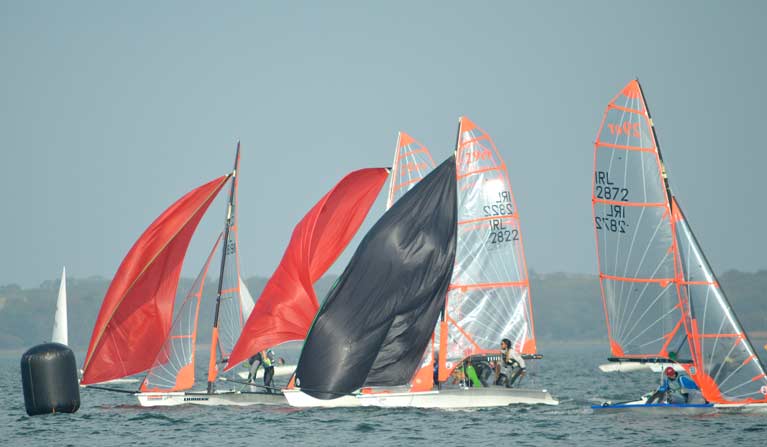 A tight battle at the leeward mark in the 29er fleet Photo: Thomas Chaix
A tight battle at the leeward mark in the 29er fleet Photo: Thomas Chaix
Day 2's forecast was good with a southerly due to head west by midday. The proceedings were a bit slow but the fleet eventually started race 4 in a medium southerly. Early leaders Cullen-Hogan were overtaken by McDonnell-Van Steenberge. The two boys were not seen again scoring their third race win of the event. The Kohl's siblings had to work their way up the fleet and secured yet another 2nd. The next race started in a dropping breeze and the expected right shift came mid race.
The race officer decided it was just that bit too much and the race was abandoned, which set the scene for a final race drama. The equation was simple enough yet required good sailing skills and clear knowledge of the rules. Having added the points, the Kohl's sibling were starting the final race with a guaranteed 2nd overall and a low discard. On the other hand, McDonnell-Van Steenberge were clear leaders yet discarding a high points first race. The Kohl's made their intentions clear in the first beat taking control of the boys windward side and started to sail them off the course in a very skilled and determined fashion. When the pair eventually made it to the windward, The boys had been put into last position with a monumental task in hand to save their event win.
The opportunity came to overtake their tormentor at the leeward of the initial lap when a 420 allowed a split between the two boats. They certainly took their chance and started to look at the fleet ahead with 3 boats still within reach. At the end of the second lap, they managed to overtake 2 boats which was just about enough to reclaim their lead. It was very tense as they held 6th to the finish which meant the countback went to their favour for the Northerns title. Lola and Atlee Kohl settle for 2nd but secured
the Triple crowns overalls. Completing the podium were Elysia O'Leary and Chris Bateman.
The second year of existence of the 29er class in Ireland has seen major progress in the level of skills and the next challenge is now to grow the numbers of partnerships attending open events... In the mean time, everyone is preparing a solid winter of training to develop further their skills... Bring on 2020!
Royal Cork's Kohl & Bateman in Top Ten of 29er Europeans
Royal Cork's Atlee Kohl (18) and Chris Bateman (18) sailing for the US Virgin Islands are seventh overall after the second day of the 29er European Championship on Lake Garda, Italy with winds at 9 to 12 knots, a bit lighter than Monday.
Kohl and Bateman who won the RS200 Nationals in Galway Bay ten days ago have switched roles for the Italian event.
The top Irish duo of nine competing crews is Charlie Cullen (17) and Ben Hogan (17) of the Royal St George Yacht Club.
Seven of the scheduled 9 races have now been completed for the 210 crews competing.
Eight different nations are in the top 10 so far and the gold fleet will see the top 50 crews compete starting today.
Final top ten after 7 races, 1 discard
1. Mathias Berthet / Alexander Franks Penty, NOR, 7 net points
2. Aristide Girou / Noah Chauvin, FRA, 14
3. Ville Korhonen / Edvard Bremer, FIN, 17
4. Marius Westerlind / Olle Aronsson, SWE, 17
5. Finn Walter / Marcus Borlinghaus, GER, 19
6. Ewan Wilson / Finley Armstrong, GBR, 22
7. Zeno Biagio Santini / Marco Misseroni , ITA, 23
8. Jens-ChristianDehn-Toftehoj / Mads Fuglbjerg, DEN, 25
9. Oliver Evans / Will Jarman, GBR, 27
10. Freya Black / James Grummet, GBR, 28
Full Results are downloadable below
Youth sailors from the Irish 29er fleet travelled to Gdynia, Poland to compete in the Zhik 29er World championships held last week, from Friday 26th to Saturday 3rd August writes Chris Bateman (17), a member of the Irish contingent that teamed up with the US Virgin Islands.
Two years ago, three Irish sailors competed in the 2017 29er World Championships in California. Since then our 29er fleet has grown steadily and to demonstrate that growth eight Irish sailors competed in this year's Worlds in Gdynia.
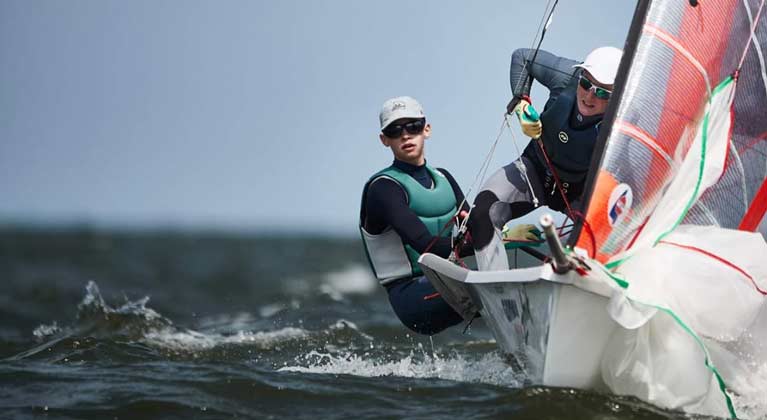 Charlie Cullen and Ben Hogan
Charlie Cullen and Ben Hogan
This year Ireland had great representation, with three full Irish teams competing. These teams were Harry Twomey and Harry Durcan (RCYC), Charlie Cullen and Ben Hogan (RStGYC), and Lola Kohl with Johnny Durcan (RCYC). Also competing, and sailing on a mixed Irish/US Virgin Island team were RCYC 29er sailors Sophie Crosbie, Dawson Kohl, Jonathan O’Shaughnessy, and Chris Bateman.
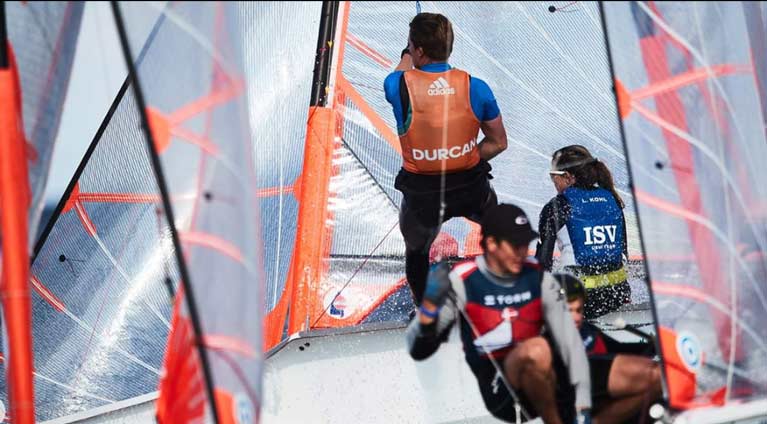 Lola Kohl and Johnny Durcan
Lola Kohl and Johnny Durcan
Gdynia is a beautiful place at this time of year, and the Irish competitors took no time in rigging their 29ers on the white sand beach opposite the city. With the event due to commence Saturday morning, boat preparation was finished a few days prior.
A light forecast was in store for the week, which held true for the first day of racing. The first gun was due for all fleets at 11 am but winds under five knots forced the sailors to stay ashore. A fickle breeze came in the afternoon, enough to send out the competitors. The light breeze suited the Irish, with every team doing well in their respective fleets. The race of the day went to Harry Twomey and Harry Durcan, scoring a sixth in race one.
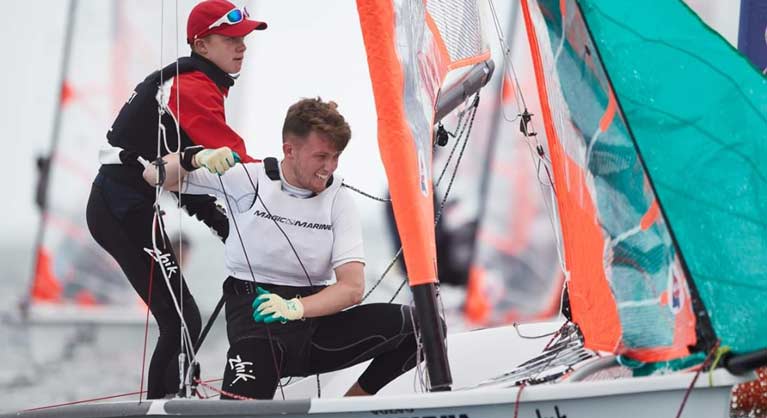 Harry Twomey and Harry Durcan
Harry Twomey and Harry Durcan
Day two proved the forecast to be wrong, with grey clouds and 15 to 20-knot winds blowing across the beach. But warm water awaited and all 178 competitors launched in good time for the traditional 11 am start. There were thrills and spills, with a big chop and strong winds making the racing tough. The Irish sailors had two bullets, with Lola Kohl and Johnny Durcan winning the first race. Harry Twomey and Harry Durcan won the last race of the day.
The sun shone down on Gdynia beach for day three of racing. A cloudless sky allowed for a thermal wind to fill in, which gave the sailors a light wind day of racing. Steep chop made the races very tough. Massive wind shifts caused chaos on the course. Luckily the Irish sailors stayed fully focused, and remained conservative to hold high positions.
Launching on day four (Wednesday) was a quick process, but a lack of wind forced the race committee to send the sailors ashore to wait for wind. This meant that the main aim of the day was to search for shade and have some fun. Unfortunately, the wind level stayed too low and racing was abandoned for the day.
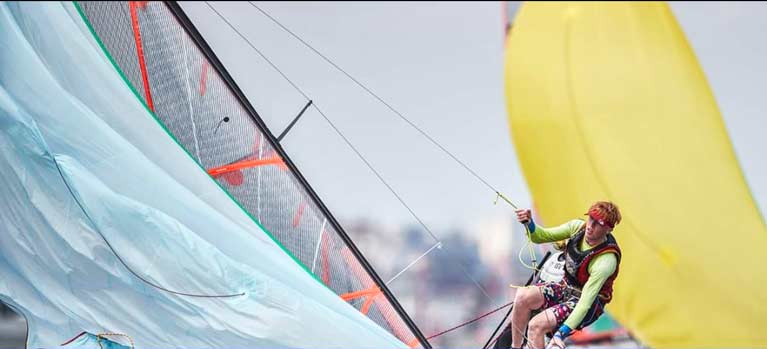 Lucy Klempen and Chris Bateman on the wire
Lucy Klempen and Chris Bateman on the wire
Day five dawned with the sun splitting the stones and a gentle 10-knot breeze blowing. Four races were scheduled, with the usual first gun at 11 am. The wind increased dramatically as the day went on, and by the last race of the day, a steady 18- 24-knot breeze was blowing. These heavy winds tested the Irish sailors to their limits. The races of the day went to two teams, Charlie Cullen and Ben Hogan, with a fifth and a third in the bronze fleet, and Lucy Klempen with Chris Bateman, scoring fifth in the final windy race in the silver fleet.
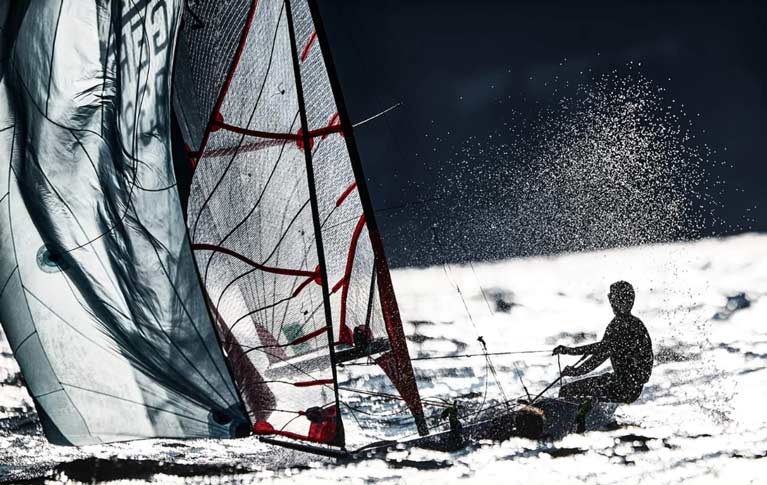 Day 5 - strong winds
Day 5 - strong winds
Day six, the final day of racing rolled around. Sunny conditions brightened the atmosphere on the beach. The points were still very close, and there was a lot to be lost and gained. A very light five-knot breeze blew on the course, making perfect sailing the only option for success. Two Irish teams sat in contention for a top 20 finish. Four difficult races were held, with both teams holding up well in the conditions.
Racing over, the closing ceremony officially ended the event on Saturday 3rd August. RCYC sailors Harry Twomey and Harry Durcan had a top-class performance, finishing in an astonishing ninth place out of 178 boats as Afloat previously reported here. Fellow Cork sailors Lola Kohl and Johnny Durcan finished in 16th place, having held on to a great top 20 result.
All of the team did great, proving that not only can you race competitively, but you can also have fun and make lifelong friends from other parts of the world. And with the rapid growth of the Irish 29er fleet, the fun will continue not just abroad, but on our home waters too.
Durcan & Twomey Finish Ninth Overall In 29er Worlds
Harry Durcan and Harry Twomey finished ninth overall at the Zhik 29er World Championships in Poland, which drew to a close yesterday (Saturday 3 August), scoring Ireland’s best result ever in the competition.
And it marks another remarkable result for the Royal Cork duo who also placed second at the RYA Youth Nationals in Weymouth this past April.
That was despite the fact it was the first time former Optimist ace Twomey was helming a 29er in competition alongside March’s Sailor of the Month.
Theirs was the top Irish result from three pairs among 175 teams competing in Gdynia — the same venue where Team Ireland were racing in the Youth Worlds last month — with Durcan’s twin Johnny not far behind in 16th overall in his mixed pair with Lola Kohl.
Also competing for Ireland over the week were Charlie Cullen (Royal St George/National YC) and Ben Hogan, who placed sixth on the Bronze fleet.
Read how a unique tie-up with the US Virgin Islands led to eight Irish sailors contesting the Gdynia Championships by Chris Bateman here.
New Owners To Retrieve ‘Mystery’ 29er Washed Up On Mayo Beach
A member of the Ireland 29er Facebook community reported an unusual find on a Mayo beach earlier this week — a dinghy in good condition washed up right by the dunes.
Helpfully the ‘mystery’ boat still had its registration badge — and with a little detective work by the Facebook group, it was discovered that the dinghy was very recently in competition in the UK, sailing at the Harken 29er Inland Championship at Grafham Water last November.
Further investigation revealed that the 29er was recently sold to new owners, who needed to ditch the boat after experiencing tidal difficulties, hence how it wound up on the beach.
The good news is that as of yesterday, it's reported that the owners say they will return to collect it. Well done all round!
A win in the second race of the Youth Sailing Worlds in Poland for Ireland's Rian Geraghty McDonnell and Nathan van Steenberge has given the National Yacht Club duo an early boost and leaves them fourth overall after three races sailed.
The Dun Laoghaire duo also scored a 12th and a 16 in their 28-boat fleet at Gydnia yesterday.
In the Girls 29er fleet, Ireland's Leah Rickard (also from NYC) and Eimer McMorrow Moriarty (from Kerry’s Tralee Bay Sailing Club) have yet to race.
Thomas Chaix is coaching the Irish 29ers. Results are here.
The Boy’s and Girl’s 29er, provided by Ovington Boats, are sharing boats in Gdynia. The 28-boat Boy’s 29er were able to complete three races but the Girl’s 29er fleet were unable to race due to dying winds.
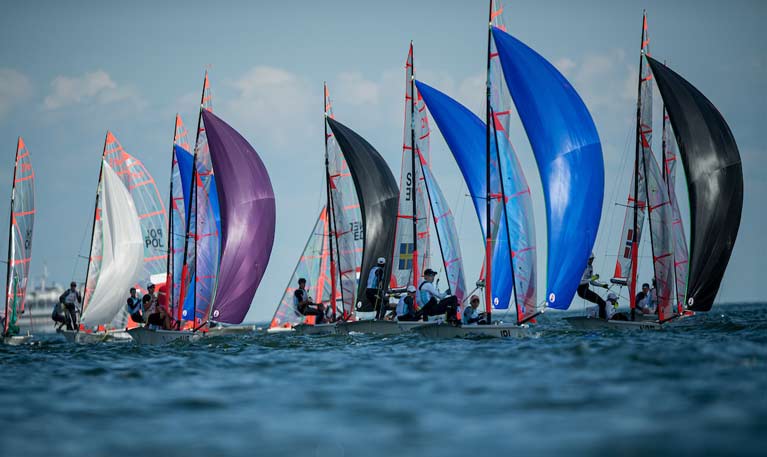 Close racing at the 29er Youth Worlds in Poland where Ireland won race two
Close racing at the 29er Youth Worlds in Poland where Ireland won race two
Finland’s Ville Korhonen and Edvard Bremer got off to a great start, posting a 1-(3)-3 scoreline. "We started well and had good speed," said Bremer, "this put us in the top three all day. It was really shifty and there were a lot of holes in the wind. It built up but it was still challenging."
Korhonen added, "The communication was good today so that helped us most. It’s been a great ever so far, really fun. We’re with the best in the world here."
Spain’s Enrique Urios Salinas and Filippo Binetti Pozzi had a tough start to the competition, sailing their way to a 22nd and a 13th but a bullet in the final race propelled them up the leaderboard.
"We didn’t start as good as we thought we would," commented the Spanish duo. "The conditions were not easy. The wind was really unstable and we couldn’t place where we wanted to place.
"We concentrated a bit more, spoke to our coach and after that we were more focused and did what we were supposed to do. We won the last leg. I think we did really well."
The Spaniards are sixth overall. Defending champions Mathias Berthet and Alexander Franks-Penty (NOR) occupy second and Sweden’s Marius Westerlind and Olle Aronsson are third.
Saturday 29th June was the opening day of the annual 29er Irish Nationals at the National Yacht Club in Dun Laoghaire with sailors competing for the coveted Cullen Cup.
A millpond greeted the competitors on arrival, but as the first gun approached, a light but constant breeze filled in to provide exciting and tactical racing under the expert supervision of the Race Officer, Brian Matthews. With 5 windward-leeward races scheduled for each day, a quick relocation of the course at the mid-point was required due to the close proximity of the cruiser racing, but once complete, the remaining races were finished by mid-afternoon and with stronger winds forecast for the following day, a very exciting event was on the cards. At the halfway point of the championships, Lola and Atlee Kohl were in pole position with Rian Geraghty-McDonnell and Nathan Van Steenberge trailing by one just point, but with a discard at race 6 and race 10 to come into play, there was still the opportunity for major shifts in the leaderboard.
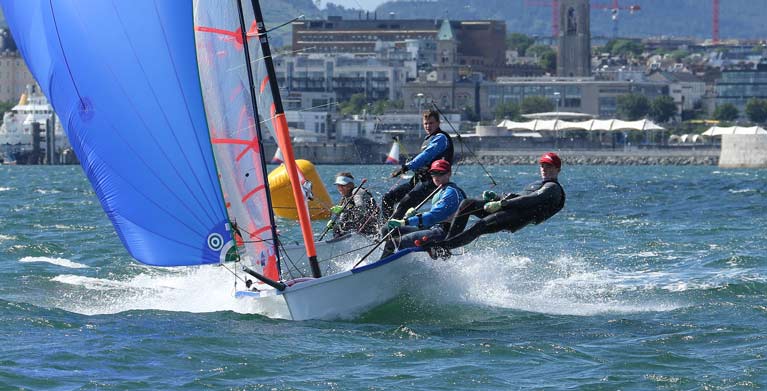
As forecast, during the night the stronger winds had filled in and two exciting races were completed before the Race Officer decided to call it a day due to increasing wind strength. At the finish of racing, the winners of the Cullen Cup were Rian Geraghty-McDonnell and Nathan Van Steenberge from NYC (in addition to U17 category winners and first All-Male team). Second place, from RCYC, went to Lola and Atlee Kohl with Chris Bateman and Lucy Klempen, also from RCYC, grabbing the third place slot. NYC’s Leah Rickard and Eimer McMorrow-Moriarty won the All-Female category.
Thank you the National Yacht Club for hosting the event and to our sponsors, Hiremate.com and Deutsche Leasing. Many thanks to Brian Matthews who did an excellent job as Race Officer and to all of the parents, club members and helpers who made this such a great event.
Twomey & Durcan Second at 29er RYA Youth Nationals in Weymouth
After a long week, a new Royal Cork Yacht Club youth sailing partnership of former Optimist ace Harry Twomey, helming a 29ers for the first time, with crew Harry Durcan produced silver medals in Weymouth yesterday.
We did 5 races Thursday from 9am-3pm then we came ashore and went back out to race another race at 6:30 pm. Focus and a clear mind was essential to secure top 5 results in 6 35 minute races.
We managed to win the only gold fleet race with a large lead. We had great boat-speed in the light and choppy conditions and young Harry Twomey was able to put us in the right place at the right time throughout the week calling great shifts which allowed us to always be near the front.
"Clean starts and the ability to stretch the fleet off the line"
Clean starts and the ability to stretch the fleet off the line while we had fantastic boat speed upwind and downwind. We spent 12 days during the winter in Lanzarote training really hard in fantastic conditions and this boat speed allowed Harry Twomey to place the boat in the correct place on the course and made my job fairly easy. I just had to trim the sails and take his orders!
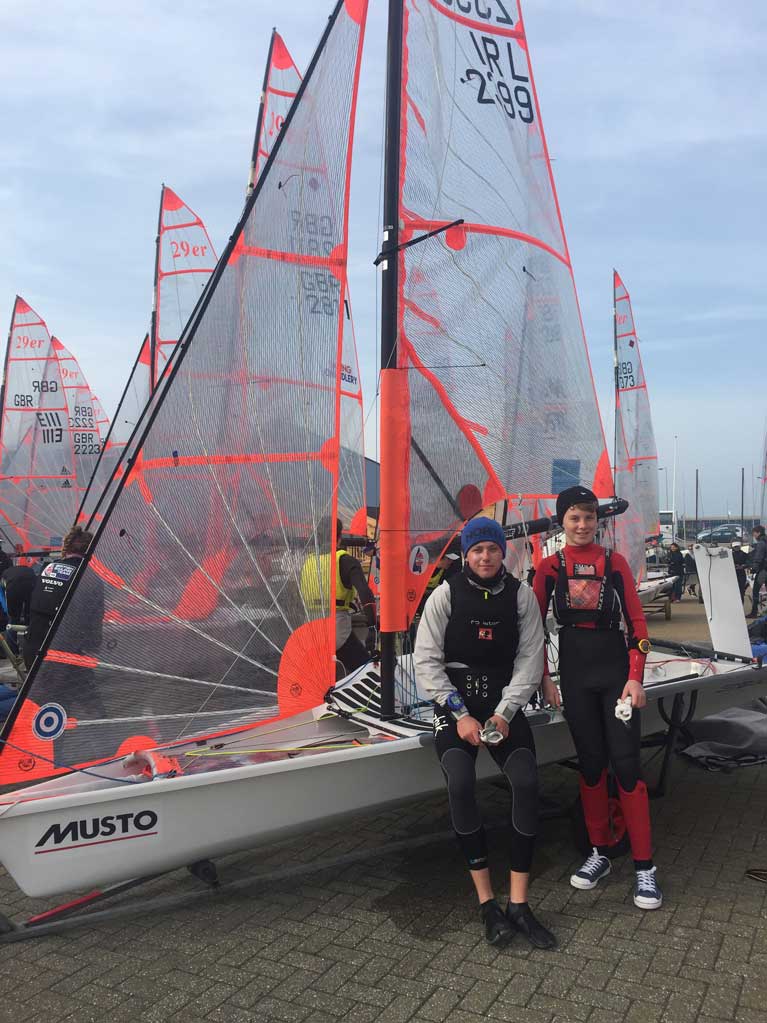 New RCYC 29er skiff duo Harry Durcan and Harry Twomey in Weymouth
New RCYC 29er skiff duo Harry Durcan and Harry Twomey in Weymouth
The Worlds in Poland, British nationals in Wales and the Europeans in Lake Garda lie ahead in the summer and after this result, we can only aim to win more medals.
Rian Geraghty-McDonnell and Nathan Van Steenberge were first juniors and sixth overall in the Harken 29er Grand Prix at Royal Torbay Yacht Club this weekend, as Yachts & Yachting reports.
Winds and rain on the Saturday gave way to Champagne sailing conditions yesterday (Sunday 24 March) for the National Yacht Club pair who placed third in Tralee Bay the weekend before, and topped a welcome Irish contingent in Devon.
The St Patrick's weekend was set to be the season launcher of the 29er class racing season with a first trip to the west to race the 2019 Westerns. Tralee Bay Sailing Club with the support of the Tralee Bay Maritime Centre had everything in place for the 'fastest growing class in the country' with teenagers ready to display their skills on the fast little skiff... except for the weather!
But the sailors are resourceful, love their sailing and could not leave Kerry without some racing. The idea of using the bank holiday Monday was already floating on the boat park on the Saturday so it did not take long to convince club volunteers and parents to put together an alternative regatta, baptised the Western Grand Prix, on Monday the 18th with 10 out of the 13 boats able to stay the extra day and enjoying 5 superb competitive races set up by visiting race officer Andrew Crosbie (Cork) just south of the Marina.
"It did not take long to convince the club and parents to put together an alternative regatta, baptised the Western Grand Prix"
Five races of 25-30 mins were sailed with great battles at every corner of the course in a 14-15kts Westerly breeze. It may not have been a ranking event, but the sailors gave it their all.
The first race saw an early retirement for gear failure (IRL2873) leaving the battle at the front to be between 2002 (Atlee Kohl and crew Jonathan O’Shaugnessy) keeping a fast Alana Coakley and Crew Marcus O’Leary hot on their tail. The heavier partnerships were definitely enjoying the breeze on offer!
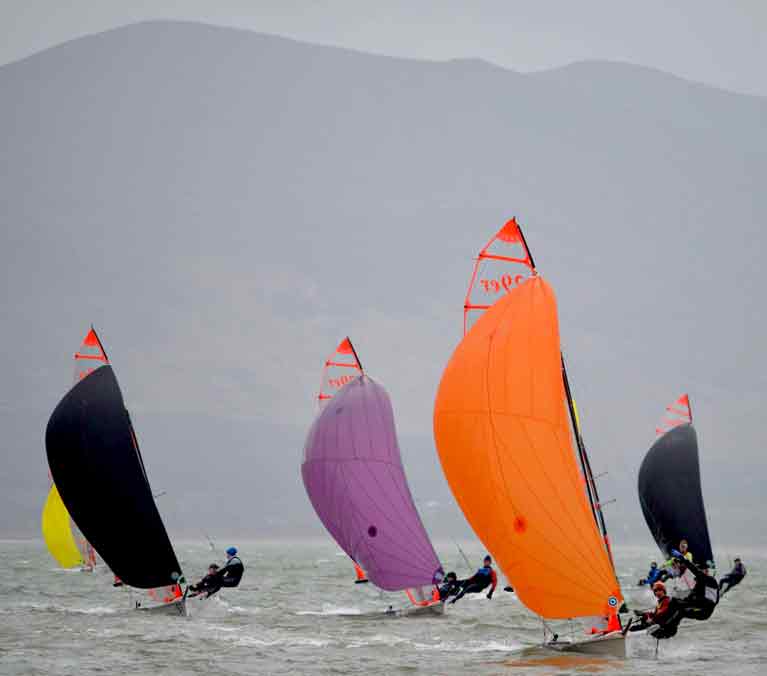 The Irish 29er fleet under the Slieve Mish mountains on Tralee Bay
The Irish 29er fleet under the Slieve Mish mountains on Tralee Bay
The fleet was very competitive showcasing the hard work these teenagers have completed over the winter. Atlee Kohl and crew Jonathan O'Shaugnessy from RCYC emerged champions and will be the first pair to put their name on a trophy presented by Commodore Liam Lynch on behalf of Tralee Bay Sailing Club. Second overall and best U17 pair were Alana Coakley and crew Marcus O’Leary. They stayed ahead of 3rd placed Rian Geraghty McDonnell and Nathan Van Steenberge on countback.
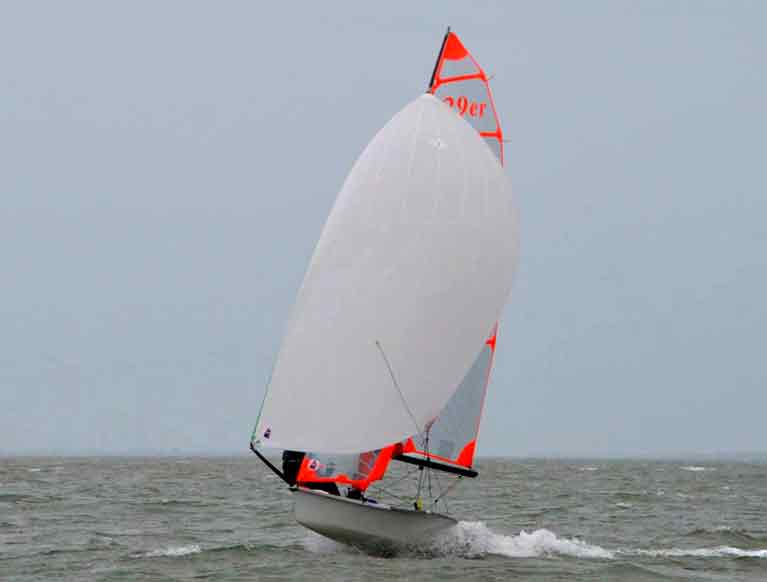 Atlee Kohl and crew Jonathan O'Shaugnessy from RCYC
Atlee Kohl and crew Jonathan O'Shaugnessy from RCYC
A couple of these pairs will be travelling next weekend to the Torbay Grand Prix in the UK to test their skills against the established UK fleet.


























